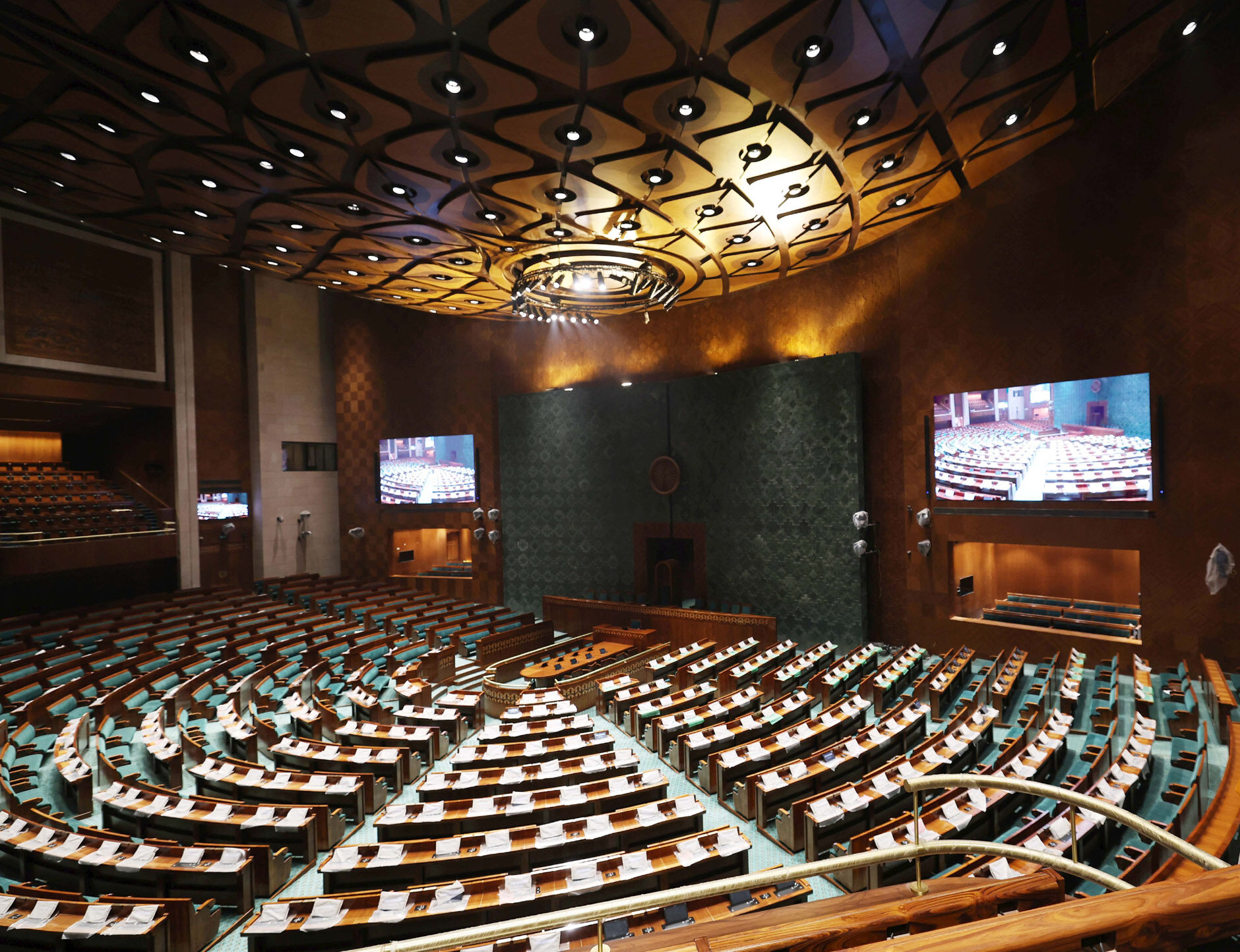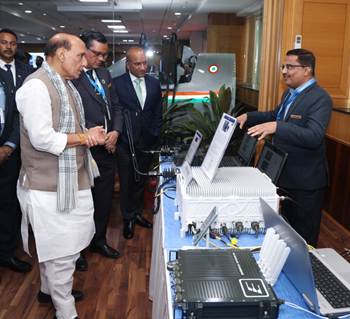
New Delhi: The Budget Session, 2025 of Parliament which commenced on Friday, January 31, 2025, adjourned sine die today. The productivity of Lok Sabha during the Budget Session, 2025 was approximately 118% and that of Rajya Sabha was approx. 119%.
In between, both Houses were adjourned for recess on Thursday, February 13, 2025, to reassemble on Monday, March 10, 2025, to enable Department-related Standing Committees to examine and report on the Demands for Grants relating to various Ministries/Departments.
Ten Government Bills were introduced and 16 bills were passed during the Fourth Session of the Eighteenth Lok Sabha.
During the Session, 134 starred questions were answered orally. A total of 691 Matters of Public Importance were raised by the Members during the Zero Hour, out of which a record number of 202 Matters of Public Importance were raised during Zero Hour on 3 April, 2025, Shri Birla informed. A total of 566 matters were taken up under Rule 377 during the Session.
Lok Sabha Speaker Om Birla informed the House that 26 sittings were held during the Session, which lasted for around 160 hours and 48 minutes. The productivity of the House during the Session was 118 per cent.
During the second part of the Session, Demands for Grants of individual Ministries of Railways, Jal Shakti and Agriculture and Farmers Welfare were discussed and voted in the Lok Sabha. In the end, the Demands for Grants of the remaining Ministries/ Departments were put to the Vote of the House on Friday, March 21, 2025. The related Appropriation Bill was also introduced, considered and passed by Lok Sabha on March 21, 2025, itself.
Appropriation Bills relating to Second and Final Batch of Supplementary Demands for Grants for the year 2024-25; Excess Demands for Grants for the year 2021-22 and Supplementary Demands for Grants of Manipur for the year 2024-25 and Demands for Grant on Account for the year 2025-26 in respect of the State of Manipur were also passed on 11.03.2025 in Lok Sabha. The Finance Bill, 2025, was passed by Lok Sabha on March 25, 2025.
The Rajya Sabha returned the Appropriation Bills related to Second and Final Batch of Supplementary Demands for Grants for the year 2024-25; Excess Demands for Grants for the year 2021-22 and Supplementary Demands for Grants for Manipur for the year 2024-25 and Demands for Grant on Account for the year 2025-26 in respect of the State of Manipur on March 18, 2025.
The Appropriation Bill relating to the Demands for Grants for the Union for the year 2025-26 and the Finance Bill, 2025 were also returned by the Rajya Sabha on 27.03.2025. As such, the entire Financial Business was completed in the Houses of Parliament before March 31, 2025.
In the Rajya Sabha the working of the Ministries of Education, Railways, Health & Family Welfare and Home Affairs were discussed. The Rajya Sabha returned the Appropriation Bills related to Second and Final Batch of Supplementary Demands for Grants for the year 2024-25; Excess Demands for Grants for the year 2021-22 and Supplementary Demands for Grants for Manipur for the year 2024-25 and Demands for Grant on Account for the year 2025-26 in respect of the State of Manipur on 18.03.2025.
The President of India addressed Members of both the Houses of Parliament on January 31, 2025, and the discussion on Vote of Thanks on the President’s Address lasted for 17 hours and 23 minutes. 173 Members participated in the discussion, Birla informed. This item engaged the Rajya Sabha for 21 Hours 46 minutes against an allotted time of 15 Hours. 73 Members participated in the debate.
The Finance Minister presented the Union Budget 2025-2026 on the floor of the House on February 1, 2025. General Discussion on the Union Budget 2025-26 lasted for 16 hours and 13 minutes against an allotted time of 12 Hours. Birla said that 169 Members participated in the discussion. The Finance Minister replied to the discussion on February 11, 2025. 169 Members took part in the debate and Rajya Sabha for 17 Hours 56 minutes against an allotted time of 15 Hours, and 89 Members participated in the discussion.
Demands for Grants of selected Ministries/ Departments were discussed in the House from March 17 to 21, 2025, and subsequently the Demands for Grants were passed by the House. The Appropriation Bill was passed in the Lok Sabha on March 21, 2025, and the Finance Bill was passed on March 25, 2025.
Birla informed that during the Session, a total of 32 Statements, including 23 Statements under Direction 73A, were made. Department-related Standing Committees presented 61 Reports, and as many as 2518 papers were laid on the Table of the House, he further said.
A Calling Attention Motion on hardships faced by the fishermen community was discussed under Rule 197 on 1 April, 2025.
As regards Private Members’ Business, a Private Member’s Resolution moved by Shafi Parambil, MP, regarding appropriate measures to regulate airfare in the country was discussed in the House on March 28, 2025 however, the discussion remained inconclusive. On April 2, 2025, Statutory Resolution ratifying the President’s Rule in Manipur was adopted by the House.
Statutory Resolution approving the proclamation issued by the President on 13th February, 2025 under Article 356(1) of the Constitution in relation to the State of Manipur was also adopted in both the Houses in their extended sittings on April 3 and 4 of April, 2025, respectively.
After the presentation of the report of the Joint Committee, the Waqf (Amendment) Bill, 2025 was passed, which seeks to focus on improving the management of waqf properties, empowerment of stakeholders relevant to management of waqf properties, improving the efficiency in survey, registration and case disposal process, and development of waqf properties. While the core purpose remains to manage waqf properties, the aim is to implement modern and scientific methods for better governance.” The Mussalman Wakf Act, 1923, was also repealed.
The Disaster Management (Amendment) Bill, 2025, seeks to bring more clarity and convergence in the roles of different organizations working in the field of Disaster Management to strengthen the efficient working of the National Disaster Management Authority and the State Disaster Management Authorities, empower the National Disaster Management Authority and the State Disaster Management Authorities to prepare the disaster plan at national level and state level, provide for creation of disaster database at national and state level, make provision for constitution of “Urban Disaster Management Authority” for State Capital and large cities having Municipal Corporation and make provision for constitutionof “State Disaster Response Force” by the State Government has also been passed.
The “Tribhuvan” Sahakari University Bill, 2025, relates to the establishment of “Tribhuvan” Sahakari University to provide education, training, and capacity building in the cooperative sector and undertake research and development activities in related areas. It will offer degree programs, distance learning and e-learning courses, and develop centres of excellence in the co-operative sector was also passed.
The Immigration and Foreigners Bill, 2025 has been passed to simplify the laws for requirements of passports or other travel documents in respect of persons entering into and exiting from India and for regulating matters related to foreigners, including the requirement of a visa and registration.
The Banking Laws (Amendment) Bill, 2025 was also passed to improve governance standards, provide consistency in reporting by banks to the RBI, ensure better protection for depositors and investors, improve audit quality in public sector banks and bring customer convenience in respect of nominations etc.
During this Session a total of 11 Bills (10 in Lok Sabha and 1 in Rajya Sabha) were introduced. 16 Bills were passed by Lok Sabha and 14 Bills were passed/returned by the Rajya Sabha. The total number of Bills passed by both Houses of Parliament was 16.
– global bihari bureau





